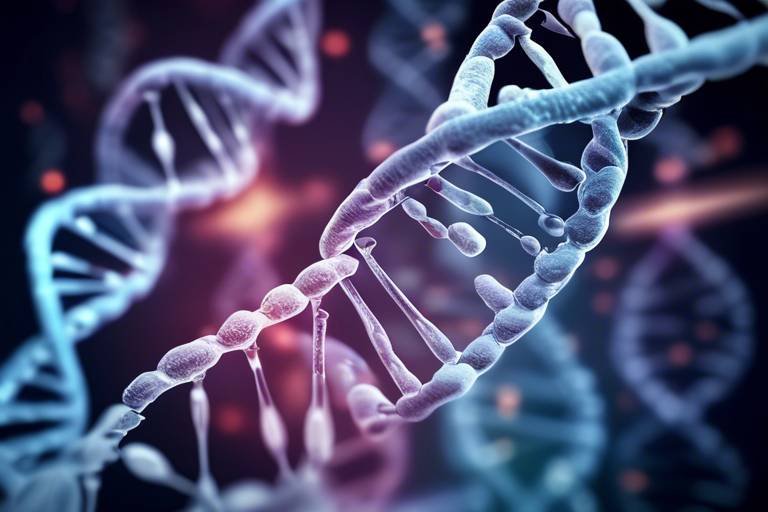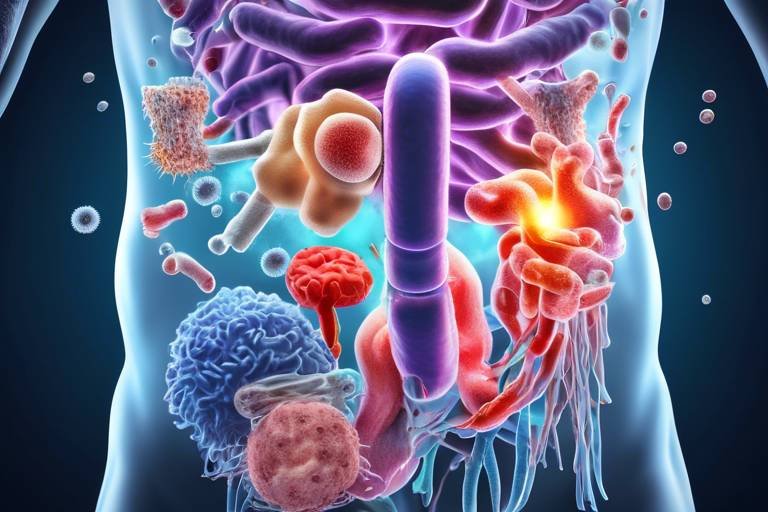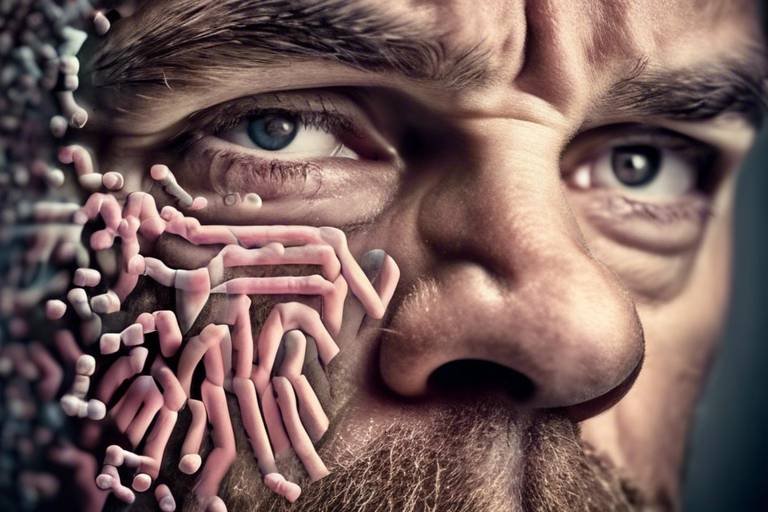The Latest Findings on the Gut-Brain Connection
The gut-brain connection is one of the most fascinating and rapidly evolving areas of research in health and wellness today. Imagine your gut as a second brain, a bustling hub of activity that influences not just digestion but also your mood, emotions, and overall mental well-being. This intricate relationship is often referred to as the gut-brain axis, and it’s becoming increasingly clear that what happens in your gut can significantly impact your mental state. Recent studies have revealed that our gut microbiota—the diverse community of microorganisms residing in our digestive tract—plays a pivotal role in this connection. The implications of these findings are profound, suggesting that improving gut health could be a key strategy in treating various psychological disorders, including anxiety and depression.
As we dive deeper into this topic, it’s essential to recognize that the gut and brain communicate through a complex network involving the nervous system, immune system, and various biochemical signals. This means that changes in gut health, such as an imbalance in gut bacteria, can send signals to the brain that may result in mood swings, anxiety, and even cognitive decline. The latest research highlights a two-way street: not only can gut health affect mental well-being, but mental states can also influence gut health. It's a dynamic interplay that underscores the importance of maintaining a healthy gut for optimal mental health.
With mental health issues on the rise globally, understanding the gut-brain connection offers a promising avenue for innovative treatments. Imagine if simply adjusting your diet or taking probiotics could help alleviate symptoms of depression or anxiety. This notion is not far-fetched; it’s supported by a growing body of evidence suggesting that specific strains of gut bacteria can modulate brain function and behavior. As we explore the latest findings, we’ll uncover how these insights can lead to more effective interventions for mental health disorders.
In this article, we will delve into the biological mechanisms that underpin the gut-brain axis, examine the impact of gut microbiota on mental health, and discuss the role of probiotics and dietary influences. We’ll also explore how stress affects gut health and highlight future directions in research that promise to deepen our understanding of this vital connection. So, buckle up as we embark on a journey through the fascinating world of the gut-brain connection!
- What is the gut-brain axis?
The gut-brain axis refers to the bidirectional communication between the gut and the brain, involving neural, hormonal, and immunological pathways.
- How does gut health affect mental health?
Gut health influences mental health through the production of neurotransmitters, immune responses, and the modulation of stress hormones.
- Can probiotics really help with anxiety and depression?
Some studies suggest that specific strains of probiotics may have a positive effect on mood and anxiety levels, but more research is needed to establish definitive conclusions.
- What dietary changes can improve gut health?
Incorporating more fiber, fermented foods, and reducing processed foods can positively impact gut microbiota and overall gut health.
- How does stress impact gut health?
Chronic stress can disrupt the balance of gut bacteria, leading to gastrointestinal issues and potentially exacerbating mental health problems.

The Gut-Brain Axis Explained
Understanding the gut-brain axis is crucial for recognizing how our digestive system and brain communicate. This complex network involves multiple pathways, including the nervous system, immune system, and hormonal signaling. Imagine your gut as a second brain, constantly sending signals to your main brain about what's happening in your body. The gut-brain axis is like a two-way street; what happens in your gut can significantly influence your mental state, and vice versa.
At the heart of this relationship lies the vagus nerve, a major player in the communication between the gut and the brain. This nerve acts as a messenger, transmitting information about gut health directly to the brain. For instance, when your gut is healthy and balanced, it sends positive signals that can uplift your mood. However, if the gut is compromised, it may send distress signals that can lead to feelings of anxiety or depression.
Moreover, the gut microbiota—trillions of bacteria residing in our intestines—plays a pivotal role in this connection. These microorganisms not only aid in digestion but also produce neurotransmitters like serotonin, which is often referred to as the "feel-good" hormone. In fact, about 90% of the body’s serotonin is produced in the gut. So, when your gut is out of balance, it can lead to a dip in serotonin levels, potentially resulting in mood disorders.
Research has shown that the gut microbiome can influence the brain's structure and function. For example, studies have indicated that certain beneficial bacteria can enhance cognitive function and protect against stress-related disorders. The relationship is so profound that some scientists are exploring the potential of microbiome-based therapies to treat various psychological conditions.
To illustrate this connection, consider the following table that summarizes the key components of the gut-brain axis:
| Component | Description |
|---|---|
| Gut Microbiota | Trillions of microorganisms that influence digestion and mental health. |
| Vagus Nerve | A major nerve that transmits signals between the gut and brain. |
| Neurotransmitters | Chemicals like serotonin produced in the gut that affect mood and cognition. |
| Immune System | Gut health impacts immune responses, which can influence mental well-being. |
The gut-brain axis is a fascinating area of research that continues to evolve. As we learn more about this connection, it opens up new avenues for understanding and treating mental health disorders. So, the next time you feel anxious or down, consider how your gut health might be playing a role. It’s a reminder that taking care of our gut is not just about physical health; it’s intertwined with our emotional and mental well-being as well.

Impact of Gut Microbiota on Mental Health
The connection between our gut and brain is more profound than many people realize. Recent studies have highlighted that the gut microbiota—the trillions of microorganisms residing in our intestines—plays a significant role in influencing our mental health. Think of your gut as a second brain; it communicates with your central nervous system and can affect everything from your mood to your anxiety levels. This relationship is often referred to as the gut-brain axis, and understanding it is crucial for anyone interested in mental wellness.
Research indicates that the composition of gut microbiota can impact the production of neurotransmitters, which are chemicals that transmit signals in the brain. For instance, about 90% of serotonin, a neurotransmitter that contributes to feelings of happiness and well-being, is produced in the gut. When the balance of gut bacteria is disrupted—due to factors like poor diet, stress, or antibiotics—this can lead to a decrease in serotonin levels, potentially resulting in mood disorders such as depression and anxiety.
In a fascinating study, researchers found that individuals with conditions like irritable bowel syndrome (IBS) often also experience higher rates of anxiety and depression. This suggests a bidirectional relationship: not only can gut health affect mental health, but mental health can also influence gut health. For example, when someone is under stress, their gut microbiota may become less diverse, leading to digestive issues and further exacerbating feelings of anxiety.
So, what can we do to support our gut microbiota for better mental health? Here are a few key points to consider:
- Dietary Choices: Incorporating a diet rich in fiber, fermented foods, and prebiotics can help maintain a healthy gut microbiome.
- Probiotics: Certain strains of probiotics have been shown to improve mood and reduce symptoms of anxiety.
- Regular Exercise: Physical activity has been linked to a more diverse gut microbiome, which is beneficial for mental health.
In summary, the impact of gut microbiota on mental health is significant. By focusing on maintaining a healthy gut, we can potentially improve our mental well-being. The science is still evolving, but the evidence is mounting that taking care of our gut is just as important as taking care of our mind.
Q: How does gut health influence mental health?
A: Gut health influences mental health through the production of neurotransmitters and the gut-brain axis, affecting mood and anxiety levels.
Q: What foods are best for gut health?
A: Foods rich in fiber, fermented foods, and prebiotics, such as yogurt, sauerkraut, bananas, and whole grains, are excellent for gut health.
Q: Can probiotics really help with anxiety?
A: Some studies suggest that specific strains of probiotics can positively impact mood and reduce anxiety symptoms, but more research is needed.

Probiotics and Their Effects
Probiotics have become a buzzword in health circles, and for good reason! These tiny, live microorganisms are often touted as a natural remedy for a myriad of health issues, particularly when it comes to our mental well-being. But what exactly are probiotics, and how do they work their magic? Essentially, probiotics are beneficial bacteria that reside in our gut, playing a crucial role in maintaining a balanced microbiome. The fascinating part is that recent research has shown a direct link between these gut dwellers and our mental health, indicating that they might be key players in the gut-brain connection.
Studies suggest that certain strains of probiotics can significantly impact mood and anxiety levels. For instance, Lactobacillus and Bifidobacterium are two well-researched strains that have demonstrated potential in alleviating symptoms of depression and anxiety. Imagine your gut as a bustling city, where these probiotics act as friendly neighbors, helping to keep the peace and order. When the balance is disrupted, it can lead to chaos, manifesting in both physical and mental health issues.
But how do these probiotics actually influence our mood? It all boils down to a complex interplay of biochemical processes. Probiotics can enhance the production of neurotransmitters, such as serotonin, often dubbed the "feel-good" hormone. In fact, did you know that about 90% of serotonin is produced in the gut? This means that maintaining a healthy gut flora could be essential for emotional stability. Furthermore, probiotics may also reduce inflammation in the body, which has been linked to various mental health disorders. So, by supporting gut health, we may also be nurturing our emotional health.
To illustrate the potential benefits of probiotics, consider the following table summarizing some key studies:
| Study | Probiotic Strain | Findings |
|---|---|---|
| 2016 Study | Lactobacillus helveticus | Significant reduction in anxiety levels among participants. |
| 2017 Study | Bifidobacterium longum | Improved mood and cognitive function in individuals with depression. |
| 2020 Meta-analysis | Various strains | Overall positive effects on anxiety and depression symptoms. |
As we delve deeper into the world of probiotics, it's crucial to remember that not all strains are created equal. The effects can vary widely based on the specific strain, dosage, and individual health conditions. Therefore, it is always a good idea to consult with a healthcare professional before starting any new probiotic regimen. They can help guide you to the right strains that may best suit your needs.
In summary, probiotics hold immense promise for improving mental health by influencing the gut-brain axis. By nurturing our gut flora, we might just unlock a new avenue for emotional well-being. So, next time you're considering enhancing your diet with probiotics, think of it as a step towards not just a healthier gut, but also a happier mind!
- What are probiotics? Probiotics are live bacteria that provide health benefits when consumed in adequate amounts.
- How do probiotics affect mental health? Probiotics can influence mood and anxiety levels by enhancing neurotransmitter production and reducing inflammation.
- Can I get probiotics from food? Yes, foods like yogurt, kefir, sauerkraut, and kimchi are rich in probiotics.
- Are all probiotics the same? No, different strains of probiotics have different effects, so it's essential to choose the right one for your needs.

Clinical Trials on Probiotics
The exploration of probiotics as a treatment for mental health disorders has gained significant momentum in recent years. Numerous clinical trials have been conducted to determine the efficacy of specific probiotic strains in alleviating symptoms of anxiety and depression. For instance, a groundbreaking study published in the journal Psychiatry Research revealed that participants who consumed a daily probiotic supplement reported a remarkable reduction in anxiety levels compared to those who received a placebo. This finding is just one of many that highlight the potential of probiotics as a viable therapeutic option.
Another noteworthy trial involved a group of individuals diagnosed with major depressive disorder. Participants were administered a multi-strain probiotic over a period of eight weeks. The results were striking; not only did the patients experience an improvement in their mood, but they also reported enhanced cognitive function and overall well-being. The researchers concluded that the gut-brain axis plays a pivotal role in mental health, and probiotics might serve as a simple, yet effective, adjunct therapy.
To further illustrate the impact of probiotics on mental health, the following table summarizes key findings from recent clinical trials:
| Study | Probiotic Strain | Duration | Outcome |
|---|---|---|---|
| Psychiatry Research (2020) | Lactobacillus rhamnosus | 8 weeks | Reduced anxiety levels |
| Journal of Clinical Psychology (2021) | Bifidobacterium longum | 6 weeks | Improved mood and cognitive function |
| Frontiers in Psychiatry (2022) | Multi-strain blend | 12 weeks | Significant decrease in depressive symptoms |
These trials not only provide hope for those struggling with mental health issues but also emphasize the importance of gut health in overall well-being. However, it’s essential to note that while the results are promising, further research is necessary to fully understand the mechanisms behind these effects. The complexity of the gut-brain connection means that individual responses to probiotics can vary widely, and what works for one person may not work for another.
In summary, the clinical trials conducted thus far have laid a solid foundation for the potential use of probiotics in mental health treatment. As the research continues to evolve, we may soon find ourselves in a world where gut health is prioritized not just for physical wellness but also as a critical component of mental health strategies.
- What are probiotics? Probiotics are live microorganisms that provide health benefits when consumed in adequate amounts, often referred to as "good" bacteria.
- How do probiotics affect mental health? Probiotics may influence mental health by modulating the gut microbiota, which in turn can affect neurotransmitter production and inflammation levels.
- Are all probiotics the same? No, different probiotic strains have different effects. Some may be more effective for mental health than others.
- Can I get probiotics from food? Yes, fermented foods like yogurt, kefir, sauerkraut, and kimchi are excellent sources of probiotics.
- How long does it take for probiotics to work? The time it takes to notice benefits can vary from person to person, but some may experience changes within a few weeks of consistent use.

Mechanisms of Action
The connection between the gut and the brain is a fascinating area of study, often described as a two-way street where communication flows in both directions. This gut-brain axis operates through several complex mechanisms, primarily involving the production of neurotransmitters, hormones, and various signaling molecules. One of the most significant neurotransmitters produced in the gut is serotonin, which is often dubbed the "feel-good" hormone. In fact, a staggering 90% of the body's serotonin is synthesized in the gastrointestinal tract. This highlights just how crucial gut health is for maintaining a balanced mood and emotional stability.
Moreover, gut bacteria play an essential role in this biochemical orchestra. They help in breaking down food, producing short-chain fatty acids (SCFAs), and regulating the immune response. SCFAs, such as butyrate, propionate, and acetate, are not just byproducts of digestion; they also serve as energy sources for gut cells and have profound effects on brain function. For instance, butyrate has been shown to have anti-inflammatory properties, potentially reducing inflammation in the brain that can lead to cognitive decline and mood disorders.
Another critical aspect of the gut-brain connection is the vagus nerve, which acts as a communication highway between the gut and the brain. It transmits signals related to gut health directly to the brain, influencing everything from mood to appetite. When gut bacteria produce metabolites, these can stimulate the vagus nerve, sending messages that affect emotional and psychological states. This is where probiotics come into play; certain strains of probiotics can enhance the production of these beneficial metabolites, leading to improved mood and reduced anxiety.
Additionally, the gut microbiome influences the hypothalamic-pituitary-adrenal (HPA) axis, which is responsible for the body’s response to stress. Dysregulation of the HPA axis can lead to chronic stress, which adversely affects both gut health and mental well-being. In essence, a healthy gut microbiome can help keep the HPA axis in check, promoting a balanced response to stress and emotional challenges.
To summarize, the mechanisms through which gut health influences mental well-being are multifaceted and intricate. They involve a combination of neurotransmitter production, the action of gut-derived metabolites, the vagus nerve's signaling pathways, and the regulation of stress responses. Understanding these mechanisms not only sheds light on the importance of maintaining a healthy gut but also opens up exciting avenues for potential treatments for various mental health disorders.
- What is the gut-brain axis?
The gut-brain axis is the bidirectional communication network between the gastrointestinal tract and the central nervous system, influencing both gut health and mental well-being. - How do probiotics affect mental health?
Probiotics can enhance the production of beneficial metabolites in the gut, which may influence neurotransmitter production and improve mood and anxiety levels. - Can diet really impact my mental health?
Yes! A diet rich in fiber, fermented foods, and healthy fats can positively influence gut microbiota, which in turn can enhance mental health. - What role does stress play in gut health?
Chronic stress can disrupt gut microbiota, leading to gastrointestinal issues and negatively impacting mental health.

Dietary Influences on Gut Health
When it comes to our health, the phrase "you are what you eat" couldn't be more accurate, especially regarding gut health. The foods we consume play a pivotal role in shaping our gut microbiome, which in turn affects our overall well-being and mental health. Imagine your gut as a bustling city, where each type of food you eat represents different vehicles on the road. Some vehicles (foods) promote smooth traffic flow, while others can cause congestion and chaos. So, what does this mean for you? It means that by making informed dietary choices, you can foster a thriving gut environment!
Research suggests that a diverse diet rich in fiber is essential for maintaining a healthy gut microbiome. Foods such as fruits, vegetables, whole grains, and legumes are packed with prebiotics—substances that feed the beneficial bacteria in your gut. Think of prebiotics as the fuel that keeps your gut bacteria happy and productive. On the flip side, a diet high in processed foods, sugars, and unhealthy fats can lead to an imbalance in gut flora, potentially resulting in issues like inflammation, anxiety, and depression.
But what specific dietary changes can you make to boost your gut health? Here are some key components to consider:
- Fiber-Rich Foods: Incorporate a variety of fruits and vegetables. Aim for at least 25-30 grams of fiber daily to promote healthy digestion.
- Fermented Foods: Foods like yogurt, kefir, sauerkraut, and kimchi are rich in probiotics, which can help replenish your gut's good bacteria.
- Omega-3 Fatty Acids: Found in fatty fish, walnuts, and flaxseeds, omega-3s can reduce inflammation and support gut health.
- Limit Sugar and Processed Foods: Reducing the intake of these foods can help maintain a balanced gut microbiome.
In addition to the types of foods you eat, the way you eat can also impact your gut health. Eating mindfully—taking the time to chew your food thoroughly and savor each bite—can improve digestion and enhance nutrient absorption. Furthermore, staying hydrated is crucial; water helps to keep your digestive system running smoothly, almost like oil in a well-functioning machine.
Lastly, it’s important to remember that everyone's gut is unique. What works for one person may not work for another, so it might take some experimentation to find the right dietary balance for you. Consider keeping a food diary to track how different foods impact your mood and gut health. This can provide valuable insights and help guide your dietary choices.

The Role of Stress in Gut Health
Stress is like a storm that sweeps through our bodies, wreaking havoc on our mental and physical health. It's fascinating how something that feels so intangible can have such a profound effect on our gut health. When we experience chronic stress, our body enters a heightened state of alertness, triggering a cascade of biological responses that can disrupt the delicate balance of our gut microbiota. This disruption can lead to a variety of issues, including digestive problems, inflammation, and even changes in mood and anxiety levels.
Research has shown that stress can alter the composition of gut bacteria, favoring the growth of harmful strains while reducing beneficial ones. This imbalance can create a vicious cycle, as poor gut health can further exacerbate feelings of stress and anxiety. Imagine your gut as a bustling city: when everything is running smoothly, the city thrives. But when stress hits, it’s like a natural disaster that causes chaos, leading to traffic jams in the form of digestive issues and emotional turmoil.
One of the key mechanisms through which stress affects gut health is the release of stress hormones, such as cortisol. Elevated cortisol levels can impair gut barrier function, allowing toxins and bacteria to seep into the bloodstream, which can trigger inflammation and other health issues. This is often referred to as "leaky gut syndrome," a condition that has been linked to various mental health disorders, including depression and anxiety.
It's essential to recognize the signs of stress and its impact on our gut health. Some common indicators include:
- Digestive issues like bloating, gas, or diarrhea
- Increased fatigue or sleep disturbances
- Heightened feelings of anxiety or irritability
By understanding the connection between stress and gut health, we can take proactive steps to mitigate its effects. Effective stress management techniques can help maintain a healthier gut-brain connection. Practices such as mindfulness meditation, yoga, and regular physical activity are excellent ways to reduce stress levels and promote overall well-being. Not only do these techniques help calm the mind, but they also foster a more balanced gut microbiome.
In conclusion, the relationship between stress and gut health is intricate and multifaceted. Recognizing how stress impacts our gut can empower us to make informed choices about our mental and physical health. By prioritizing stress management and adopting a holistic approach to wellness, we can create a healthier environment for our gut and, in turn, improve our mental well-being.
1. How does stress affect gut health?
Stress can disrupt the balance of gut bacteria, leading to digestive issues and inflammation, which can further impact mental health.
2. What are some signs of stress affecting my gut?
Common signs include digestive problems, fatigue, sleep disturbances, and increased anxiety or irritability.
3. What are effective stress management techniques?
Techniques such as mindfulness meditation, yoga, and regular exercise can help reduce stress and promote gut health.
4. Can improving gut health help with stress management?
Yes, a balanced gut microbiome can positively influence mood and reduce feelings of anxiety, creating a beneficial cycle for mental health.

Stress Management Techniques
Stress has become an ever-present companion in our fast-paced lives, but the good news is that there are effective that can help us reclaim our mental and gut health. Think of stress as a sneaky thief that not only robs us of our peace but also wreaks havoc on our gut microbiota. So, how can we outsmart this thief? Let's dive into some practical strategies that can help you manage stress and, in turn, support your gut-brain connection.
One of the most powerful tools at our disposal is mindfulness meditation. This ancient practice encourages us to focus on the present moment, allowing our minds to take a break from the constant chatter of daily life. Research has shown that mindfulness can reduce cortisol levels, the hormone associated with stress, and enhance our overall emotional well-being. Just imagine sitting quietly for a few minutes, focusing on your breath, and feeling the weight of stress slowly lift off your shoulders. It’s like giving your mind a mini-vacation!
Another effective technique is physical exercise. Whether it’s a brisk walk, a yoga session, or a high-energy workout, moving your body releases endorphins—those feel-good hormones that can instantly elevate your mood. Exercise doesn’t just improve your physical health; it also has profound effects on your gut health. Studies have indicated that regular physical activity can increase the diversity of gut microbiota, which is crucial for a healthy gut. So, next time you're feeling overwhelmed, consider lacing up your sneakers and hitting the pavement or the gym.
Additionally, cultivating strong social connections can significantly alleviate stress. Engaging with friends and family, sharing a laugh, or simply enjoying a conversation can act as a buffer against stress. Social support not only boosts our mood but also has a positive impact on our gut health. After all, humans are social creatures, and our relationships play a crucial role in our overall well-being. So, don’t hesitate to reach out to a friend for a chat or plan a fun outing!
Lastly, don't underestimate the power of a balanced diet. Foods rich in omega-3 fatty acids, probiotics, and fiber can help support both your gut health and your mental well-being. Incorporating foods like fatty fish, yogurt, and whole grains into your meals can create a nurturing environment for your gut microbiota. It’s like feeding the good bacteria in your gut, giving them the fuel they need to thrive and combat stress more effectively.
In conclusion, managing stress is not just about coping mechanisms; it's about creating a holistic approach that encompasses mindfulness, physical activity, social connections, and nutrition. By integrating these techniques into your daily routine, you can enhance your gut health and foster a more resilient mind. Remember, the journey to a healthier gut-brain connection is a marathon, not a sprint. So take it one step at a time, and celebrate your progress along the way!
- What is the gut-brain axis? The gut-brain axis is the bidirectional communication network between the gut and the brain, influencing both mental and physical health.
- How does stress affect gut health? Chronic stress can disrupt the balance of gut microbiota, leading to digestive issues and negatively impacting mental health.
- Can probiotics help with stress management? Yes, certain strains of probiotics have been shown to improve mood and reduce anxiety, making them a valuable tool in stress management.
- What dietary changes can support gut health? Incorporating more fiber, fermented foods, and omega-3 rich foods can significantly improve gut health.

Future Directions in Research
As we stand on the brink of a revolution in our understanding of the gut-brain connection, the future directions in research are both exciting and promising. Scientists are increasingly recognizing the intricate relationship between our gut health and mental well-being, leading to a surge of interest in exploring this connection further. The potential implications for treating psychological disorders are profound, and researchers are eager to uncover the mechanisms that underpin this relationship.
One of the most intriguing areas of future research involves personalized nutrition. As we learn more about the unique composition of individual gut microbiomes, tailored dietary recommendations could become a reality. Imagine being able to optimize your mental health through a diet specifically designed for your gut flora! This could involve identifying specific probiotics or dietary fibers that enhance the growth of beneficial bacteria in your gut, thereby improving mood and reducing anxiety.
Moreover, there is a growing interest in the role of dietary patterns in shaping our gut microbiota. Future studies may explore how different diets—such as the Mediterranean diet, plant-based diets, or even ketogenic diets—affect not only gut health but also mental health outcomes. Researchers are beginning to ask questions like: Which dietary patterns are most effective for enhancing mood? Can certain foods act as natural antidepressants by fostering a healthier gut microbiome?
Another promising avenue for research is the impact of gut-brain communication on neurodegenerative diseases. Conditions like Alzheimer's and Parkinson's are being scrutinized for their potential links to gut health. Investigating how gut bacteria influence inflammation and neurotransmitter levels could lead to groundbreaking therapies aimed at slowing or even reversing cognitive decline. This connection might help us understand why certain individuals are more susceptible to these diseases and how we can intervene early.
Additionally, the exploration of gut-brain signaling pathways is crucial. Understanding the biochemical pathways that facilitate communication between the gut and the brain will provide insight into how we can manipulate these signals for therapeutic benefits. For instance, researchers are examining how gut-derived metabolites influence brain function and mood regulation. This could lead to the development of new medications or supplements that specifically target these pathways.
Lastly, we cannot overlook the importance of longitudinal studies in this field. By tracking individuals over time, researchers can gain a better understanding of how changes in gut health correlate with fluctuations in mental health. This approach could reveal critical insights into the timing and nature of interventions, helping us to pinpoint when and how to best support individuals struggling with mental health issues.
In summary, the future of gut-brain research is bright, with numerous avenues waiting to be explored. From personalized nutrition to understanding neurodegenerative diseases, the potential for discovering new therapies is immense. As we continue to unravel the complexities of this connection, we may soon find ourselves equipped with powerful tools to enhance mental well-being through the lens of gut health.
- What is the gut-brain connection? The gut-brain connection refers to the bidirectional communication between the gut and the brain, influencing both physical and mental health.
- How can gut health affect mental well-being? Gut health can influence the production of neurotransmitters and hormones, which play a crucial role in regulating mood and anxiety levels.
- Are probiotics effective for mental health? Some studies suggest that specific strains of probiotics may improve symptoms of depression and anxiety, but more research is needed.
- What dietary changes can support gut health? Incorporating more fiber, fermented foods, and reducing processed foods can help promote a healthier gut microbiome.
- How does stress impact gut health? Chronic stress can disrupt the balance of gut bacteria and lead to gastrointestinal issues, which can further affect mental health.
Frequently Asked Questions
- What is the gut-brain axis?
The gut-brain axis is the complex communication network linking the gut and the brain. It involves biochemical signaling between the gastrointestinal tract and the central nervous system, influencing both physical and mental health.
- How does gut health affect mental well-being?
Gut health plays a crucial role in mental well-being because the gut microbiota can produce neurotransmitters and other chemicals that affect mood. A balanced gut microbiome can lead to improved mental health, while an unbalanced one may contribute to anxiety and depression.
- Can probiotics really improve mental health?
Yes, specific strains of probiotics have shown promise in improving mental health. Research suggests that they can help alleviate symptoms of depression and anxiety by influencing neurotransmitter levels and reducing inflammation.
- What dietary changes can support gut health?
Incorporating more fiber-rich foods, fermented products, and prebiotics can significantly enhance gut health. Foods like yogurt, sauerkraut, and whole grains nourish beneficial gut bacteria, promoting a healthier microbiome.
- How does stress impact gut health?
Chronic stress can disrupt the balance of gut microbiota, leading to gastrointestinal issues and exacerbating mental health conditions. Stress hormones can alter gut permeability and inflammation, affecting overall gut function.
- What are some effective stress management techniques?
Techniques such as mindfulness meditation, regular exercise, and deep breathing can help manage stress effectively. These practices not only reduce stress but also promote a healthier gut-brain connection.
- What does the future hold for gut-brain research?
The field is rapidly evolving, with ongoing studies exploring new probiotics, dietary interventions, and their effects on mental health. Future research may lead to innovative treatments for psychological disorders rooted in gut health.



















